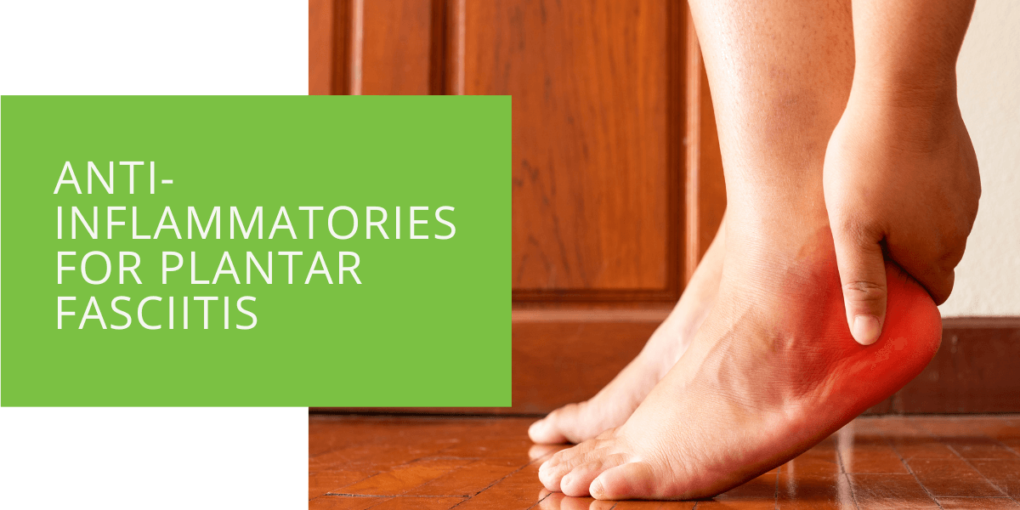Anti-Inflammatories for Plantar Fasciitis
Plantar fasciitis is a common foot condition that causes pain and inflammation in the bottom of the foot, specifically in the tissue connecting the heel bone to the toes (the plantar fascia). Symptoms include pain and stiffness in the foot, particularly in the heel and arch, and pain worse upon waking up or after standing.
Inflammation is a key component of plantar fasciitis, and reducing inflammation can be an important part of treatment. One way to reduce inflammation is through anti-inflammatories, which are medications that work to reduce inflammation in the body. This article will discuss the top over-the-counter (OTC) anti-inflammatories for plantar fasciitis and important considerations to keep in mind when taking these medications.
What Are Anti-Inflammatories?
Anti-inflammatories, also known as nonsteroidal anti-inflammatory drugs (NSAIDs), are a type of medication that reduces inflammation in the body. Inflammation is a normal response by the body's immune system to injury or infection, and it is characterized by swelling, redness, warmth, and pain. While inflammation is a necessary part of the healing process, chronic inflammation can lead to various health problems.
Anti-inflammatories work by inhibiting the production of certain chemicals in the body called prostaglandins, which are involved in the inflammation process. By reducing the production of prostaglandins, anti-inflammatories can help to reduce inflammation and associated pain.
Several anti-inflammatories are available over the counter, including ibuprofen, naproxen, and aspirin. These medications are available in various forms, including tablets, capsules, gels, and creams.

Top Over-the-Counter Anti-Inflammatories for Plantar Fasciitis
Ibuprofen (Advil, Motrin)
Ibuprofen is a commonly used OTC anti-inflammatory that reduces inflammation and pain. It is available in tablets, capsules, and gels.
Ibuprofen works by inhibiting prostaglandins' production, which helps reduce inflammation and associated pain. It is effective at relieving pain and inflammation in a variety of conditions.
However, it is important to note that ibuprofen can cause side effects, including stomach upset, nausea, and drowsiness. It can also increase the risk of gastrointestinal bleeding and ulcers, so it is important to use caution and follow the dosing instructions on the label.
Naproxen (Aleve, Naprosyn)
Naproxen is another OTC anti-inflammatory that is effective at reducing inflammation and pain. It is available in tablets and capsules.
Like ibuprofen, naproxen works by inhibiting prostaglandins' production, which helps reduce inflammation and associated pain. It relieves pain and inflammation in various conditions, including plantar fasciitis.
However, naproxen can also cause side effects, including stomach upset, nausea, and drowsiness. It can also increase the risk of gastrointestinal bleeding and ulcers, so it is important to use caution and follow the dosing instructions on the label.

Aspirin
Aspirin is another OTC anti-inflammatory that is effective at reducing inflammation and pain. It is available in tablets and capsules.
Aspirin works by inhibiting prostaglandins' production, which helps reduce inflammation and associated pain. It relieves pain and inflammation in various conditions, including plantar fasciitis.
However, aspirin can also cause side effects, including stomach upset, nausea, and drowsiness. It can also increase the risk of gastrointestinal bleeding and ulcers, so it is important to use caution and follow the dosing instructions on the label. Additionally, aspirin should be used with caution in people allergic to it or with certain medical conditions, such as bleeding disorders.
Ketoprofen (Orudis, Oruvail)
Ketoprofen is another OTC anti-inflammatory that is effective at reducing inflammation and pain. It is available in tablets and capsules.
Like ibuprofen and naproxen, ketoprofen works by inhibiting prostaglandins' production, which helps reduce inflammation and associated pain. It relieves pain and inflammation in various conditions, including plantar fasciitis.
However, ketoprofen can also cause side effects, including stomach upset, nausea, and drowsiness. It can also increase the risk of gastrointestinal bleeding and ulcers, so it is important to use caution and follow the dosing instructions on the label.

Important Considerations
It is important to consult with a healthcare professional before taking any medication, including OTC anti-inflammatories. A healthcare professional, such as a podiatrist or primary care doctor, can help determine the most appropriate treatment for your specific situation and advise you on the potential risks and benefits of taking these medications.
It is also important to follow the label's dosing instructions and consider potential interactions with other medications you may be taking. Some medications can interact with OTC anti-inflammatories, increasing the risk of side effects or reducing the effectiveness of the medication.
Conclusion
OTC anti-inflammatories, such as ibuprofen, naproxen, and aspirin, can effectively reduce inflammation and pain in people with plantar fasciitis. However, it is important to consult with a healthcare professional before taking these medications and to consider potential side effects and interactions with other medications. By working with a healthcare professional, you can determine the most appropriate treatment plan to help relieve pain and inflammation.
FAQ
What is plantar fasciitis and what are its symptoms?
Plantar fasciitis is a common foot condition that causes pain and inflammation in the bottom of the foot, specifically in the tissue connecting the heel bone to the toes (the plantar fascia). Symptoms include pain and stiffness in the foot, particularly in the heel and arch, and pain worse upon waking up or after standing.
How can anti-inflammatories help treat plantar fasciitis?
Anti-inflammatories, also known as nonsteroidal anti-inflammatory drugs (NSAIDs), are a type of medication that reduces inflammation in the body. Inflammation is a key component of plantar fasciitis, and reducing inflammation can be an important part of treatment. By inhibiting the production of certain chemicals in the body called prostaglandins, which are involved in the inflammation process, anti-inflammatories can help to reduce inflammation and associated pain.
What are the top over-the-counter (OTC) anti-inflammatories for plantar fasciitis?
The top OTC anti-inflammatories for plantar fasciitis include ibuprofen (Advil, Motrin), naproxen (Aleve, Naprosyn), and aspirin. These medications are available in various forms, including tablets, capsules, gels, and creams.
What are the potential side effects of OTC anti-inflammatories?
OTC anti-inflammatories can cause side effects, including stomach upset, nausea, and drowsiness. They can also increase the risk of gastrointestinal bleeding and ulcers, so it is important to use them with caution and follow the dosing instructions on the label.
Should I consult with a healthcare professional before taking OTC anti-inflammatories for plantar fasciitis?
Yes, it is important to consult with a healthcare professional before taking any medication, including OTC anti-inflammatories. A healthcare professional, such as a podiatrist or primary care doctor, can help determine the most appropriate treatment for your specific situation and advise you on the potential risks and benefits of taking these medications.
Are there any other treatment options for plantar fasciitis?
In addition to OTC anti-inflammatories, other treatment options for plantar fasciitis may include stretches and exercises to improve flexibility and strength in the foot and ankle, wearing proper footwear, using orthotic inserts, and getting a heel pain injection from a podiatrist. The most appropriate treatment will depend on the severity of the condition and the individual's specific needs.
Can OTC anti-inflammatories provide pain relief for plantar fasciitis?
OTC anti-inflammatories can effectively reduce inflammation and pain in people with plantar fasciitis. However, it is important to consult with a healthcare professional before taking these medications and to consider potential side effects and interactions with other medications. By working with a healthcare professional, you can determine the most appropriate treatment plan to help relieve pain and inflammation.

